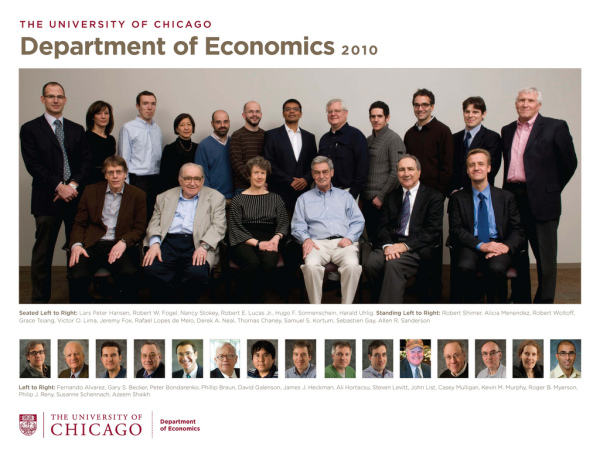What happens when a small and dangerous sect captures the teaching of economics The fallacy of composition basically consists of the false belief that the whole is nothing but the sum of its parts. In the society and in the economy this is arguably not the case. An adequate analysis of society and economy a fortiori can’t proceed by just adding up the acts and decisions of individuals. The whole is more than a sum of parts. This fact shows up when orthodox/mainstream/neoclassical economics tries to argue for the existence of The Law of Demand – when the price of a commodity falls, the demand for it will increase – on the aggregate. Although it may be said that one succeeds in establishing The Law for single individuals it soon turned out – in the Sonnenschein-Mantel-Debreu theorem firmly established already in 1976 – that it wasn’t possible to extend The Law of Demand to apply on the market level, unless one made ridiculously unrealistic assumptions such as individuals all having homothetic preferences – which actually implies that all individuals have identical preferences. This could only be conceivable if all agents are identical (i. e. there is in essence only one actor) — the (in)famous representative actor.
Topics:
Lars Pålsson Syll considers the following as important: Economics
This could be interesting, too:
Lars Pålsson Syll writes Schuldenbremse bye bye
Lars Pålsson Syll writes What’s wrong with economics — a primer
Lars Pålsson Syll writes Krigskeynesianismens återkomst
Lars Pålsson Syll writes Finding Eigenvalues and Eigenvectors (student stuff)
What happens when a small and dangerous sect captures the teaching of economics

The fallacy of composition basically consists of the false belief that the whole is nothing but the sum of its parts. In the society and in the economy this is arguably not the case. An adequate analysis of society and economy a fortiori can’t proceed by just adding up the acts and decisions of individuals. The whole is more than a sum of parts.
This fact shows up when orthodox/mainstream/neoclassical economics tries to argue for the existence of The Law of Demand – when the price of a commodity falls, the demand for it will increase – on the aggregate. Although it may be said that one succeeds in establishing The Law for single individuals it soon turned out – in the Sonnenschein-Mantel-Debreu theorem firmly established already in 1976 – that it wasn’t possible to extend The Law of Demand to apply on the market level, unless one made ridiculously unrealistic assumptions such as individuals all having homothetic preferences – which actually implies that all individuals have identical preferences.
This could only be conceivable if all agents are identical (i. e. there is in essence only one actor) — the (in)famous representative actor. So, yes, it was possible to generalize The Law of Demand – as long as we assumed that on the aggregate level there was only one commodity and one actor. What generalization! Does this sound reasonable? Of course not. This is pure nonsense!
How has neoclassical economics reacted to this devastating findig? Basically by looking the other way, ignoring it and hoping that no one sees that the emperor is naked.
Having gone through a handful of the most frequently used textbooks of economics at the undergraduate level today, I can only conclude that the models that are presented in these modern neoclassical textbooks try to describe and analyze complex and heterogeneous real economies with a single rational-expectations-robot-imitation-representative-agent.
That is, with something that has absolutely nothing to do with reality. And — worse still — something that is not even amenable to the kind of general equilibrium analysis that they are thought to give a foundation for, since Hugo Sonnenschein (1972) , Rolf Mantel (1976) and Gerard Debreu (1974) unequivocally showed that there did not exist any condition by which assumptions on individuals would guarantee neither stability nor uniqueness of the equlibrium solution.
So what modern economics textbooks present to students are really models built on the assumption that an entire economy can be modeled as a representative actor and that this is a valid procedure. But it isn’t — as the Sonnenschein-Mantel-Debreu theorem irrevocably has shown.
Of course one could say that it is too difficult on undergraduate levels to show why the procedure is right and to defer it to masters and doctoral courses. It could justifiably be reasoned that way – if what you teach your students is true, if The Law of Demand is generalizable to the market level and the representative actor is a valid modeling abstraction! But in this case it’s demonstrably known to be false, and therefore this is nothing but a case of scandalous intellectual dishonesty. It’s like telling your students that 2 + 2 = 5 and hope that they will never run into Peano’s axioms of arithmetics.
Once the dust has settled, there is a strong case for an inquiry into whether the teaching of economics has been captured by a small but dangerous sect.
